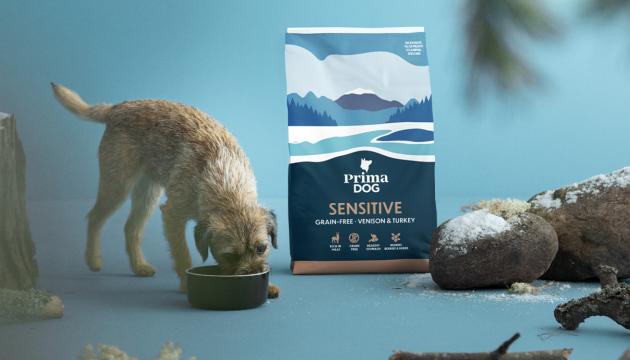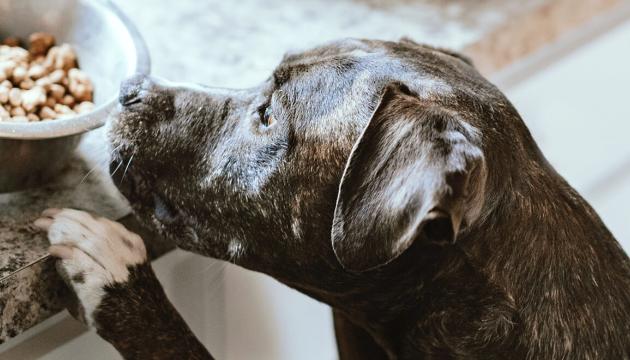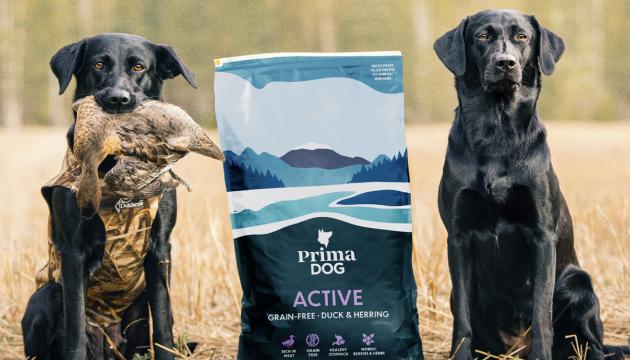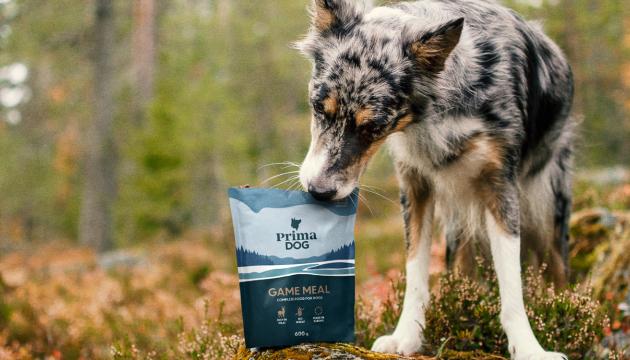

Puppy food and how to feed a puppy
Sorting out the right puppy food for your pup is a big deal in their early days. A growing puppy needs a good dose of energy, protein, and a balanced mix of minerals and vitamins to thrive.
Easiest way to keep things balanced is with a complete puppy food, such as dry dog food for puppies. If the puppy eats mainly homemade or raw dog food, the puppy's diet must be very carefully planned so the puppy gets all the nutrients it needs.
Around 70% of the puppy’s daily food should be complete puppy food, giving those little rascals all the goodness they need to grow up strong and healthy.
When a puppy moves from its breeder to a new home, it is a smart move to stick with the puppy food the pup has used to eat. Changing homes is a major event for a tiny puppy, and the stress it causes can give the puppy’s tummy a bit of a wobble. Once the pup has settled in, you can gradually change the puppy’s food if you like. Read more about changing your dog's food.
Feeding a puppy – What is good food for a puppy?
Check the quality and energy content: Go for a top-notch puppy food that has got meat or fish as the main ingredient. Be sure to choose dog food designed for puppies, since adult dog food usually does not have enough energy and protein for a growing puppy. A good quality puppy food should have about 30% protein and 20% fat.
Ensure the nutrients: If you are thinking of going all in with homemade or raw dog food, you must be clued up on dog nutrition. You see, meat alone won't give your puppy all the nutrients it needs. That is why a high-quality complete puppy food is the safest choice for the base for your puppy’s diet.
Mix it up: Introduce your puppy to foods with different textures and protein sources. This way your puppy gets used to different flavours and types of dog food. At the same time, you will enrich your pup’s gut microbes that might reduce the likelihood of atopic symptoms and food allergies.
About 30% of the puppy’s daily food can be the wet dog food, sausages for dogs or meat. You can give your puppy both raw and cooked meat, but if you want to cook it stick to boneless meats.
A bit of variety in the puppy’s diet does wonders for the immune system and can keep allergies at bay. Pups go through a growth spurt from around 7 weeks to 6 months, which is a super important phase for the development of their gut microbes. Learn more how to add variety to your dog’s diet.
How long do puppies eat puppy food?
Feeding a puppy is all about fuelling up a growing dog. Once your puppy hits its adult size, it is time to switch from puppy food to the adult dog food. Read PrimaDog’s guide how to feed an adult dog.
Each tail-wagger grows and develops at its own pace, but the little ones tend to zoom ahead in the growth game compared to the big fellas. Your pint-sized puppy might hit its full size at 10–12 months, while the big lads take a bit longer, usually around 1.5 to 2 years. Even after this stretch, the dog is still beefing up those muscles, which means they are burning energy like nobody's business. So, keep that good energy-rich dog food coming for your youngster!
Is your puppy going to be an active sporting or working dog when it grows up? Check out our tips on feeding an active dog and how to estimate the dog’s energy level.
How much a puppy eats?
PrimaDog puppy food packages always come with an indicative feeding recommendation. It is a good starting point to figure out how much to dish out for your puppy.
A puppy’s daily food intake depends on:
- The puppy’s age
- Assumed weight as an adult
- Activity level
- The amount of daily exercise
- How quick the puppy is growing
Keep an eye on your tiny rascal’s progress each week and adjust the portion size if needed. We want a steady gain, not a pudgy pup.
How often should a puppy be fed?
A 7-10 week old puppy that has moved from its breeder to a new home will eat 3–4 times a day until about six months of age. After that, you can gradually cut back on the feedings. Grown-up dogs usually tuck into their bowls 1–2 times a day.
Setting up a routine gives your puppy a sense of security and makes it a breeze for them to pick up on their indoor manners and other everyday skills. This is why it is a good idea to feed your puppy around the same time every day.
The right food is only one part of a puppy's life. Read our tips on what your puppy needs and how to teach the puppy important everyday skills.
PrimaDog puppy food – delicious complete dog food for every puppy
PrimaDog Chicken & Potato for puppies of all breeds is a wheat-free, meaty dry dog food that supports the growth of the little puppy into an active adult. This puppy food brings the energy and fat the puppy needs, plus just the right dose of calcium and phosphorus for healthy bone development. And it is not just for pups! PrimaDog puppy food is also ideal for feeding pregnant and nursing bitches. Learn more about our puppy food.




